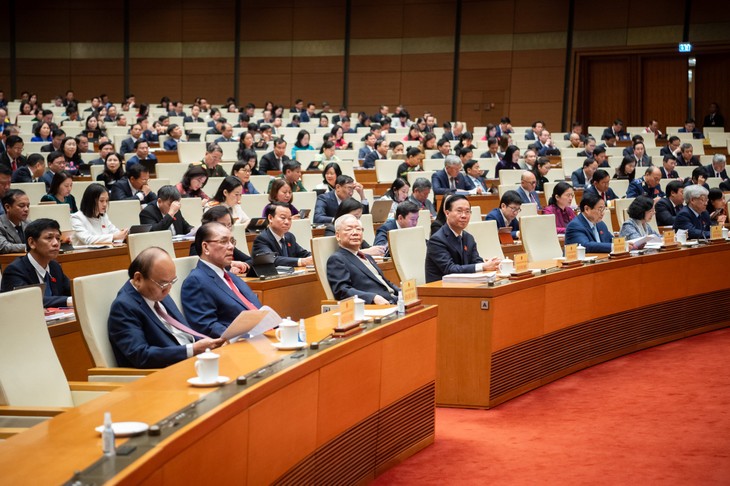(VOVWORLD) - The revised Land Law was passed at the closing session of the National Assembly’s 5th extraordinary session on Thursday morning. The result is of special importance in Vietnam's political and socio-economic life, national defense, and environmental protection. The law enforcement will have profound impacts on all walks of life and the business community. It marks the completion of one of the most important legislative tasks of the 15th National Assembly.
 The revised Land Law is adopted at the closing session of the National Assembly’s 5th extraordinary session on January 18th, 2024. (photo: quochoi.vn) The revised Land Law is adopted at the closing session of the National Assembly’s 5th extraordinary session on January 18th, 2024. (photo: quochoi.vn) |
432 of 477 National Assembly deputies (88%) voted for the revised Land Law.
Reforming land regulations
According to Chairman of the National Assembly Economic Committee Vu Hong Thanh, the draft Land Law was carefully and meticulously prepared through multiple rounds by the National Assembly, its Standing Committee, the Government, and relevant agencies.
It was discussed at four sessions of the National Assembly, two meetings of full-time deputies, and eight official meetings of the National Assembly Standing Committee, and was revised after acquiring the opinions of experts and over 12 million other people.
“The National Assembly considered the draft Land Law at the 5th extraordinary session under special process and all opinions of deputies were listened to and discussed. This shows the commitment of the National Assembly and legislative agencies to high quality and efficiency,” Mr. Thanh said.
The promulgation of the revised Land Law will remove obstacles and balance the interests of the State, the people, and investors. The Land Law will create growth momentum to recover the stagnant real estate market.
It specifies the land pricing mechanism, and mobilizes social resources in infrastructure construction under the public-private partnership and decides land bidding or auction to convert purposes of use to support socio-economic development policies.
Nguyen Chu Hoi, a deputy for Hai Phong, said: “The law adoption creates excitement at the beginning of the new year. It also provides opportunities for the Government to operate more easily to minimize social and environmental impacts so that Vietnam can achieve its goals and have a clean land reserve for long-term use.”
Land policy for ethnic minority groups is the fundamental focus of ethnic affairs. The revised Land Law has clearly stipulated regulations for ethnic minorities with new amendments and supplements to lay a legal basis and create better livelihoods for ethnic communities.
Institutionalizing the Party's guidelines
The revision of the 2013 Land Law started on August 2020 when the Prime Minister established a Steering Committee to review the Land Law enforcement and amend it. The Ministry of Natural Resources and Environment was in charge of writing the draft Land Law.
The drafting process made institutionalizing the Party's viewpoints and guidelines a prerequisite. It institutionalized the general goals and major policies of the Party Central Committee’s Resolution on Continuing to innovate and refine institutions and policies, improving the effectiveness and efficiency of land management and use, and creating drivers to turn the country into a high-income developed country.
The revision covers innovating and improving the quality of land planning and use, fine-tuning regulations on land allocation and land lease, converting land use purposes, more specific regulations on authority, purpose, and scope of land retrieving, and a mechanism for determining land prices according to market principles.
The law also fine-tunes financial mechanisms and policies, regulations related to the real estate market, and policies on the management and use of agricultural land. It defines management and use of land for multiple purposes, such as residential land combined with commerce and service activities. The revised Land Law will take effect on January 1, 2025.